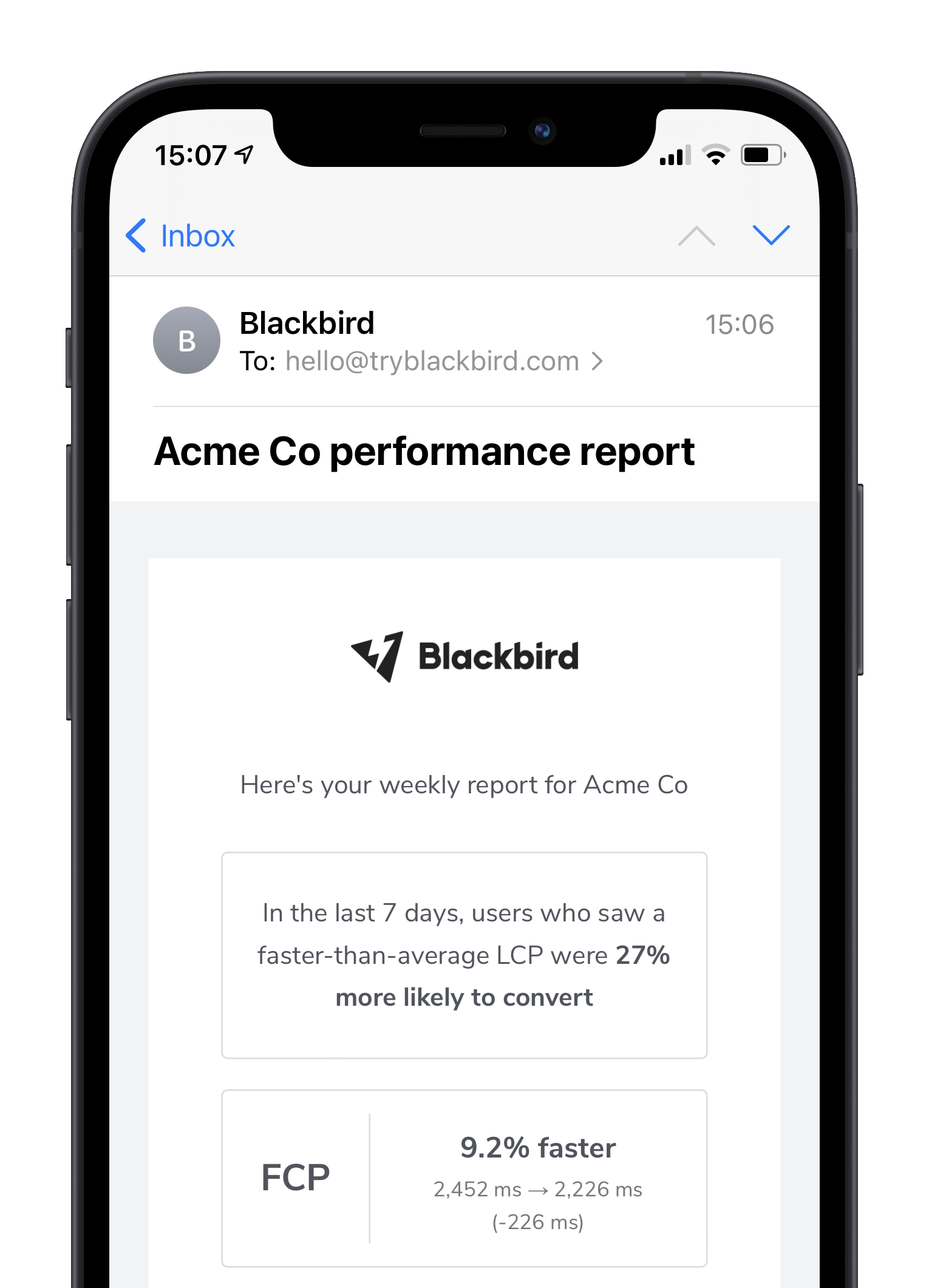Get More Revenue From Organic Search
Measure and improve your site speed to increase your conversion rate, drive more revenue from organic search, and — maybe — rank better
Start Your Free Trial No credit card requiredTrack the Core Web Vitals (and lots more)
Blackbird automatically tracks the Core Web Vitals for your users over time, so you can make sure you're delivering not just a fast site, but a great user experience.
Measure site speed for real users
Not everyone sees the same loading times for your site. People on faster devices and connections will have a better experience than others. Blackbird measures highly accurate speed metrics for every visit to your site, so you get the true picture.
Prove that speed is worth focusing on
Blackbird tracks speed metrics and conversion data for your visitors, so it can show you when faster visits have a better conversion rate.
Visits with a faster-than-average LCP are 25% more likely to convert, with a conversion rate of 4.41% vs 3.44%
Data is statistically significant
Put a number to your recommendations
Because Blackbird tracks revenue data for all of your fast and slow visits, it can use your actual sales data to predict how much extra revenue could be gained by improving things like Largest Contentful Paint.
Based on the last 7 days, we've predicted how much additional revenue would be gained by improving Largest Contentful Paint by 500ms.
Keep tabs on competitors
Blackbird automatically pulls data from Chrome's User Experience Report every week, so you can see how you stack up against your competitors.
Stay on top of site speed
Get a weekly speed report emailed every Monday morning, so you can stay on top of things, and keep your client and team informed of progress.

Try it for free today
Start your free 30 day trial - no credit card required
Start Your Free 30 Day Trial No credit card required
Common Questions
How is this different to Lighthouse?
Lighthouse is great - we love it. But it works by running one test, and tells you what your site speed metrics look like for just that one data point.
In reality your visitors will be on different devices, screen sizes, different connection speeds, in different locations - and will be seeing different site speeds as a result. One data point won't give you the full story when you have hundreds of thousands of visitors.
Blackbird tracks the site speed metrics for all of your visitors - down to the millisecond - so you'll have a much clearer picture of how fast your site really is.
Can't I get this data from Search Console?
We're big fans of Search Console, and it's really good for telling you which URLs might have issues, but it also has it's limitations. It shows your metrics on a 28 day rolling average, which means if a change rolls out that slows the site down, the site will look like it gradually gets slower over the next 28 days - meaning that change is likely to not be noticed for a month, if at all. Blackbird can show you what your metrics look like today, and if a change rolls out that slows the site down, it can alert you within 24 hours.
Search Console also doesn't have competitor tracking, is only limited to the Core Web Vitals, won't send you alerts if any of those metrics spike, can't tell you how much more revenue you'd earn from site improvements, and lots more.
How is this different to the page speed report in Google Analytics?
The page speed report in Google Analytics can be useful to get a quick overview - but it mainly reports on "load time", which is when the window.onload event fires. This is a bit of a legacy metric - it doesn't always correspond with when users actually start to see content appear. Modern metrics like First Contentful Paint and Largest Contentful Paint are much better, but Google Analytics doesn't track these.
It also uses the mean for averages, which means it can be very heavily skewed by extremely fast or slow load times (which are surprisingly common with web performance). It's much more useful to use the median instead - which is what Blackbird uses.
Google Analytics also heavily samples your data - and for many sites this means that they're only collecting 1% of speed metrics for their visitors. Blackbird aims to capture as close to 100% of your site traffic as possible.
How does Blackbird work?
Blackbird is a lightweight tracking tag that you add to the site. It captures metrics like SSL connection time and Time To First Byte, as well as more frontend focused metrics like First Contentful Paint, Largest Contentful Paint and JavaScript CPU time - and it does this for your actual visitors, so you can a true picture of your page timings.
You also need to add a small piece of code on your Thank You page so that it can register that a user has converted, and what the order value was. This let's Blackbird tell you if faster visits have a better conversion rate, and tell you how much extra revenue could be made from making site speed improvements.
Does the tracking tag have a performance impact?
All JavaScript tags will have some impact, but we've worked hard to ensure ours has as small an impact as possible. It's less than 5kb, served from a CDN, and loads asynchronously. It's not on your critical path and won't delay rendering - and we also fully support deferring the tag, so it only has a minimal impact.